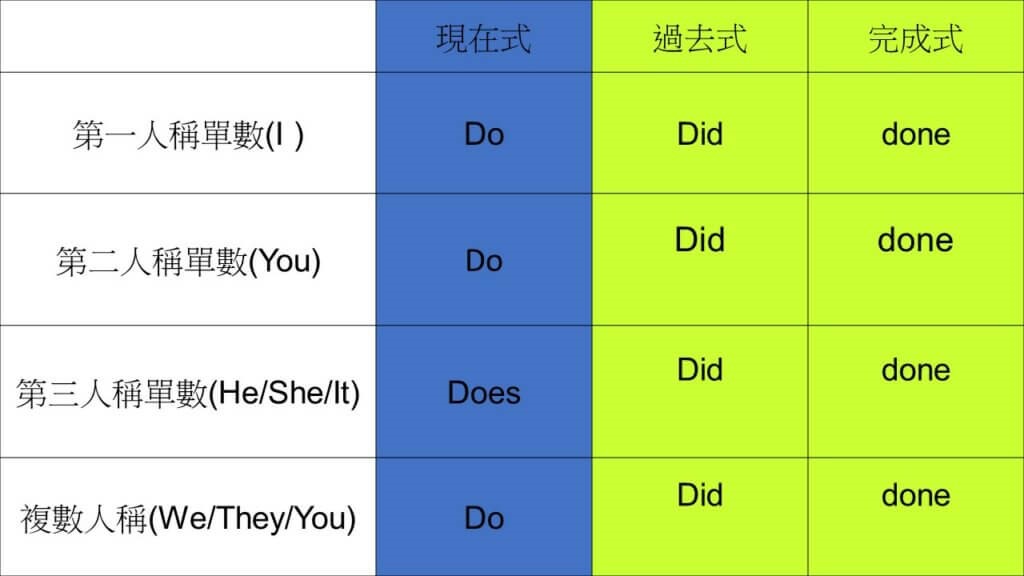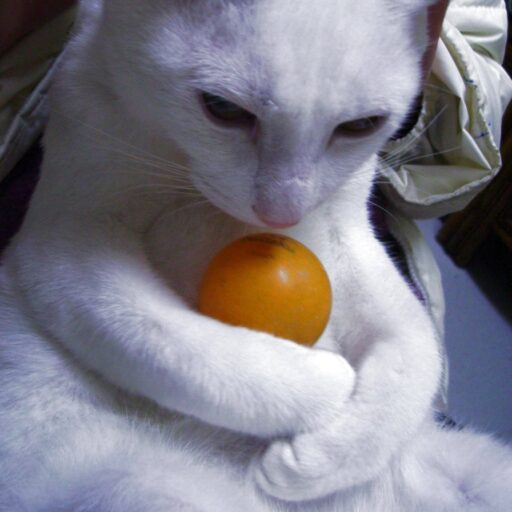依人稱來決定使用do 還是does
第一人稱單複數 I (我) We (我們)
第二人稱單複數 You (你) You(你們)
第三人稱複數 They (他們) ;人名(複數2個或2個人以上) 「Cindy and Judy」; 兩件事物 (a pen and a eraser)
第三人稱單數 He (他) She (她) It (它) 人名(單數 一個人的) 「Cindy」 ;單樣事物 (a pen)
I 是因為英文裡注重個人所已單獨使用一個BE動詞 am
而第二人稱以及第三人稱複數名詞需要使用 are 記法:人多就配字多
第三單數記法:人少所以配字少的
而這個觀念轉do與does 以及第三人稱單數動詞要加s
記法:英文裡很注重個人以及對方,所以I與you都有舉足輕重的地位
大家都玩過翹翹板吧,因此重的那一頭會向下是吧
所以英文裡大家要有平衡阿~~第三人稱單數的動詞我們要幫他們加s讓它可以跟大家一樣重
而第三人稱的複數因為有兩個人或兩個人以上,所以人多已經夠重了所以不需要加s,
第三人稱,人少阿,所以幫助形成疑問句或否定句的助動詞要加s阿
又因為字尾為s.ch.sh.z.o.x字尾結尾的動詞所以要加es
| 主詞 | 助動詞現在式 | 過去式 |
| 第一人稱單複數 | do | did |
| 第二人稱單複數 | do | did |
| 第三人稱單數 | does | did |
| 第三人稱複數 | do | did |

do does否定用法
替一般動詞形成否定句時,需使用助動詞,將助動詞do +not放入句中:
I like the show.
→I don’t like the show.(我不喜歡那場表演)
He likes the show.
→He doesn’t like the show.(他不喜歡那場表演)
助動詞之後須使用原型動詞
do does疑問句用法
一般動詞形成疑問句需使用助動詞,放於句首
Do you like the show?你喜歡那場表演嗎?
答句皆是Yes or No
Yes, I do.
No, I don’t.
Does he like the show? 他喜歡那場表演嗎?
Yes, he does.
No, he doesn’t.
1.你喜歡貓嗎?Do you like cats?
a.先肯定簡答,再詳答。Yes, I do. I like cats.
b.先否定簡答,再詳答。No, I don’t. I don’t like cats.
2.他們有筆記本嗎?Do they have notebooks?
a.先肯定簡答,再詳答。Yes, they do. They have notebooks.
b.先否定簡答,再詳答。No, they don’t. They don’t have notebooks.
3.你/你們喝水嗎?Do you drink water?
a.先肯定簡答,再詳答。Yes, I /we do. I/We drink water.
b.先否定簡答,再詳答。No, I/we don’t. I/We don’t drink water.
4.你不喜歡蔬菜嗎?不,我不喜歡。Don’t you like vegetables? No, I don’t.
5.Jimmy和Mike喜歡騎腳踏車嗎? 是的,他們喜歡騎腳踏車。
Do Jimmy and Mike like to ride the bikes? Yes, they do. They like to ride the bikes.
1. Jamie不吃豬肉。Jamie doesn’t eat pork.
2. Darren:Peter 每天下午泡澡嗎? Daniel:是的,他是。
Darren: Does Peter take a bath every afternoon?
Daniel: Yes, he does.
3.Dora:你的弟弟們每星期六有和你一起彈吉他嗎?
Iris:不,他們沒有。
Dora: Do your brothers play the guitar with you on Saturdays?
Iris: No, they don’t.
1. Sam:她每天早上7點做什麼? Danny:她每天早上7點吃早餐。
Sam: What does she do at 7 a.m. every day?
Danny: She eats breskfast at 7 a.m. every day.
2. Ruby:Sam 每天晚上做什麼? Peggy:Sam 每天晚上做作業。
Ruby: What does Sam do every night?
Peggy: Sam does his homework every night.
3.Danny: Lisa每天下午在學校做什麼?
Colby:她們每天下午在學校運動。
Danny: What do Lisa and Kate do at school every afternoon?
Colby: They exercise at school every afternoon.
4. Kevin:Tom每天傍晚在做什麼? Fred:他每天傍晚煮飯。
Kevin: What does Tom do every evening?
Fred:He cooks dinner every evening.
5.Eric每天早上在臥室使用手機。
Eric uses this cellphone every morning.
6.Judy 沒有鞋子。 Judy doesn’t have shoes.
7. 他沒有吃早餐。 He doesn’t eat/have breakfast.
( A) 1.A: What ________ she do every afternoon? B: She ________ every afternoon.
(A) does; paints (B) does; paint(C) do; paints (D) do; paint
( B) 2. ______ Mia and Cindy run to school every day.
(A) Does (B) Did (C) Do (D) Are
( D ) 3. A: Does Henry like lions? B: Yes, he ________.
(A) don’t (B) doesn’t (C) do (D) does
( B ) 4. Ben ________ to school in the morning.
(A) go (B) goes (C) am going (D) are going
( A ) 5. He ________ dance at home on Sundays.
(A) doesn’t (B) don’t (C) do (D) is
( A ) 6.Matt and Hank don’t like kangaroos, but Ann ________.
(A) does (B) do (C) doesn’t (D) don’t
( A ) 7.A: What ________ she do every afternoon?
B: She ________ every afternoon.
(A) does; paints (B) does; paint (C) do; paints (D) do; paint
( C )8. He ________ the food and ________ it.
(A) cooks; taste (B) cook; taste
(C) cooks; tastes (D) cook; tastes
( C )10. A: Does Lilly ________ every evening?
B: Yes, she ________ every evening.
(A) sings; sings (B) sings; sing
(C) sing; sings (D) sing; sing
( A )9. She ________ like English, but she ________ Japanese.
(A) doesn’t; likes (B) doesn’t; like (C) does; likes (D) does; like
( D )11. A: ________ Kevin eat beef noodles? B: No, he ________.
(A) Do; don’t (B) Do; doesn’t
(C) Does; don’t(D) Does; doesn’t
do一般動詞使用
do 除了可以當助動詞外,亦有一般動詞的用法,解釋為「做」 ,請參考do 與make 用法差異
I do my homework every day. 我每天做功課。
He does the laundry every day. 他每天洗衣服。
do還可以用於肯定句,表加強語氣。=really
I do love you. (我真的愛你)
Will you marry me? Yes, I do.
- am is are was were 與do does did done
- 現在簡單式─第三人稱單數
- 現在進行式文法
- do does 英文文法
- 頻率副詞文法 always usually often sometimes seldom never
- How often詢問頻率 多常做某事
- 過去式BE動詞was were文法句型
- 過去式動詞變化規則與發音
- 過去式文法句型
- 過去進行式英文文法
- 未來式 Will & be going to
- 現在完成式文法
- 過去完成式 英文文法
- 過去完成進行式
- 未來完成進行式 will have been ving by the time
- 英文文法時態總整理
- 英文動詞三態變化記憶口訣
